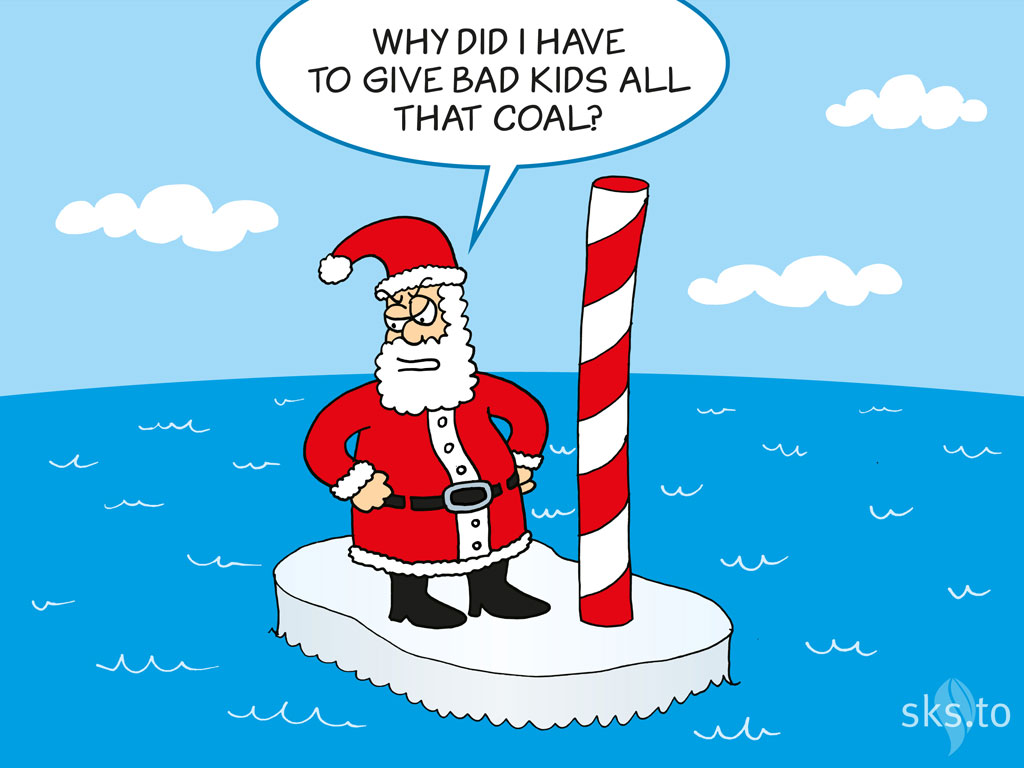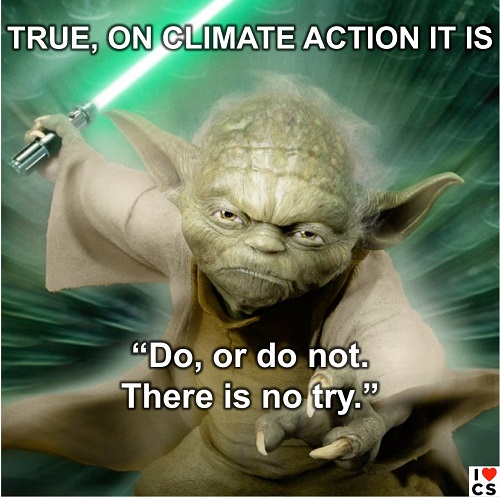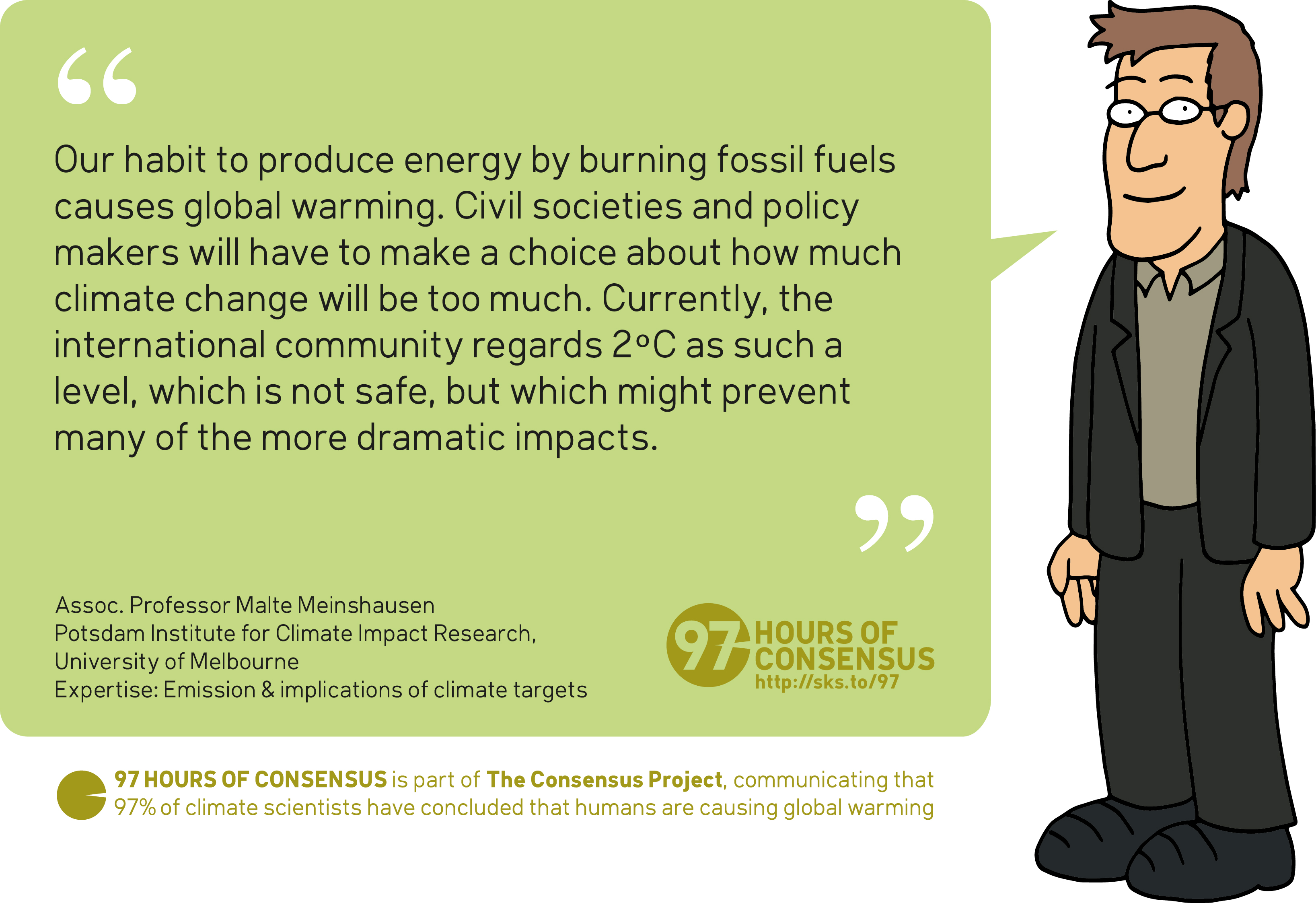2015 SkS Weekly Digest #51
Posted on 20 December 2015 by John Hartz
SkS Highlights... El Niño Impacts... Toon of the Week... Quote of the Week... He Said What?... Coming Soon on SkS... Poster of the Week... SkS Week in Review... 97 Hours of Consensus...
SkS Highlights
The Paris agreement signals that deniers have lost the climate wars by Dana Nuccitelli (Climate Consensus - the 97%, The Guardian) attracted the highest number of comments of the articles posted on SkS during the past week. Why climate contrarians are wrong by Michael Shermer (Scientific American) garnered the second highest number. Myles Allen: Can we hold global warming to 1.5°C? by Myles Allen (Carbon Brief) drew the third highest.
El Niño Impacts
- El Niño 2015: Impacts Weather Patterns Across the Globe, Skymet Dec 17, 2015
- New York's Tropical December Days: Climate Change or El Nino? by Brian K Sullivan, Bloomberg Business News, Dec 17, 2015
- They Call Him El Nino by Charlie Lopresti, Check in with Charlie, Dec 17, 2015
- Winter Outlook Update: January - March 2016 to Feel Influence of Strong El Niño by Jon Erdman, The Weather Channel, Dec 18, 2015
- 2016 'very likely' to be globe’s hottest year on record by Darwin Malicdem, Inernational Business Times, Dec 18, 2015
Toon of the Week

Original cartoon by John Cook
Quote of the week
With their landmark accord following talks in Paris, world leaders have hammered out not only the first global commitment to combat climate change, but arguably the most significant public health treaty of our time.
“The stakes are high,” World Health Organization Director-General Margaret Chan told negotiators on December 8. “A ruined planet cannot sustain human lives in good health.”
Chan’s sobering words echoed a June report by the Lancet Commission on Health and Climate Change that warned global warming could wipe out a half-century of public health gains. That has helped fuel a movement to combat climate change among health-care professionals, who are tackling both global warming's impact on public health as well as their own carbon footprint.
Climate Accord Mobilizes Health Industry by Sam Ross-Brown, The American Prospect, Dec 18, 2015
He Said What?
But Sen. Marco Rubio (R-Fla.) came out hard against the deal at a campaign rally in Las Vegas on Monday, calling it an “unfunny joke of a climate deal” and warning that the U.S. would hurt its economy by trying to cut emissions faster than other countries, like China.
“[China is] going to keep that deal so long as it doesn't hurt their ability to grow their economy,” he said.
“Well guess what: it's going to hurt their ability to grow their economy. Which means they're not going to do it. This kind of unilateral disarmament in our economy is reckless and it is hurting the American Dream.”
Republicans grope for way to kill Paris climate agreement by Devin Henry, The Hill, Dec 20, 2015
Coming Soon on SkS
- The best climate science and humanity come together at AGU 2015 (Dana)
- AGU 2015: Scientists offer latest update on worsening state of Arctic (Roz Pidcock)
- The Ghosts of Climate Past, Present and Future: Part 1 (howardlee)
- The Ghosts of Climate Past, Present and Future: Part 2 (howardlee)
- The Ghosts of Climate Past, Present and Future: Part 3 (howardlee)
- 2015 SkS Weekly News Roundup #52 (John Hartz)
- 2015 SkS Weekly Digest #52 (John Hartz)
Poster of the Week

SkS Week in Review
- 2015 SkS Weekly News Roundup #51 by John Hartz
- Why climate contrarians are wrong by Michael Shermer (Scientific American)
- Haitians are noticing climate change impacts on extreme weather and agriculture by John Abraham (Climate Consensus - the 97%, The Guardian)
- December 2015 Floods: a floating postcard from the UK by John Mason
- Myles Allen: Can we hold global warming to 1.5°C? by Myles Allen (Carbon Brief)
- The Paris agreement signals that deniers have lost the climate wars by Dana Nuccitelli (Climate Consensus - the 97%, The Guardian)
- 2015 SkS Weekly Digest #50 by John Hartz
97 Hours of Consensus: Malte Meinshausen

Quote derived with author's permission from:
"Our habit to produce energy by burning fossil fuels causes global warming. Civil societies and policy makers will have to make a choice about how much climate change will be too much. Currently, the international community regards 2C as such a level, which is not safe, but which might prevent many of the more dramatic impacts."































 Arguments
Arguments






























Articles like “Why Climate Contrarians are Wrong” are interesting and important but they only address part of the story. And the part not addressed is the more important matter regarding the development of 'public better understanding of what is actually going on'.
The assessment of where the understanding of the scientific community has developed to regarding the impacts of creating excess CO2 by burning of fossil fuels is important. However, it is only part of the more important issue of better understanding the acceptance of (resistance to) that developing better understanding of what is going on globally (by all of humanity). And the CO2 issue is only one of many cases of converging lines of evidence clearly indicating that people with unacceptable attitudes (greedy and intolerant people) have been able to continue to succeed in spite of the developing better understanding of their unacceptable pursuits.
The continued success of misleading messages designed to delay the acceptance of climate science in the general population proves that understanding how to deliver a stronger presentation of the science cannot be separated from understanding why there would be reluctance to accept the developing better understanding of what is actually going on. A clearer or stronger presentation of the science by itself will not overcome the motivations for people to not want to accept the developing better understanding. The inappropriate motivations of 'the masses' also need to be effectively pointed out.
A preference for personal benefit leads many people to resist better understanding something that is actually possible for them to understand. Such people willingly believe unsubstantiated messages created by undeserving wealthy and powerful people who acquired wealth and power by not caring about the sustainability of what they do or the potential negative impacts of their pursuits on others. Such people can become so powerful in a region or an organization/corporation that the region or organization/corporation becomes a powerful mechanism for prolonging or expanding the unacceptable pursuits of benefit by such people.
The 1987 UN Report “Our Common Future” includes a very good summation of what was, and continues to be, going on:
“25. Many present efforts to guard and maintain human progress, to meet human needs, and to realize human ambitions are simply unsustainable - in both the rich and poor nations. They draw too heavily, too quickly, on already overdrawn environmental resource accounts to be affordable far into the future without bankrupting those accounts. They may show profit on the balance sheets of our generation, but our children will inherit the losses. We borrow environmental capital from future generations with no intention or prospect of repaying. They may damn us for our spendthrift ways, but they can never collect on our debt to them. We act as we do because we can get away with it: future generations do not vote; they have no political or financial power; they cannot challenge our decisions.”
Climate science and the developing better understanding of the unacceptability of burning fossil fuels and may other 'popular and profitable human pursuits' that contribute to the unsustainable creation of problems other people will have to deal with and suffer the consequences of, has made it very apparent that 'individualism, popularity and profitability' can be impediments to the advancement of humanity.
I am currently re-reading Susan Cain's “Quiet - The Power of Introverts in a World That Can't Stop Talking”. In chapter 8 she presents a comparison of developing understanding of the differences between historically more introverted Asian cultures and historically more extroverted “Western” cultures. She mentions the significance of higher reverence in Asian cultures for people who actually better understand something (education and learning). But her second explanation deserves quoting rather than paraphrasing:
“Another explanation is group identity. Many Asian cultures are team-oriented, but not in the way that Westerners think of teams. Individuals in Asia see themselves as part of a greater whole - whether family, corporation, or community - and place tremendous value on harmony within their group. They often subordinate their own desires to the group's interests, accepting their place in its hierarchy.
Western culture, by contrast, is organized around the individual. We see ourselves as self-contained units; our destiny is to express ourselves, that we,m and we alone, were brought into this world to do. We may be gregarious but we don't submit to group will, or at least we don't like to think we do. ...”
She also explains that these generalizations do not apply to entire population groups, but explain the different cultural influences that can affect how a person will develop their fundamental tendencies regarding introversion and extroversion. It is clear that “Western” thinking has significantly penetrated into Asian cultures. And it is also clear that even the “Asian” way of thinking limited to a single nation can develop very damaging consequences.
Relating that to the struggle to get acceptance of 'the developing better understanding of climate science and the changes required to develop a lasting better future for a robust diversity of humanity as a sustainable part of a robust diversity of life on this amazing planet', it is easy to understand how the “Asian” attitude must be extended to all life (not just be restricted to humanity, and definitely not just be restricted to a portion of humanity) for humanity to advance, and how the “Western” attitude can be a powerful temptation and a strong impediment to the advancement of humanity.
The popularity of perceptions of personal prosperity developed by getting away with understood to be unacceptable and unjustified actions encourages many people to develop the attitude that personal pursuits in a person's lifetime should take precedence over better understanding how to participate in developing a better future for all. Many people become inclined to think that if better understanding means less potential for personal benefit, or means having to give up undeserved developed perceptions of prosperity, then 'that' better understanding needs to be fought against. That attitude can build very powerful groups of like-minded individuals who will seek out 'leaders and presenters of information' that suit 'their interests'.
The “Winners take all” competition of individuals and groups attitude prevalent in Western societies and economics needs to be seen as “Cheaters have a competitive advantage by being willing to do things they can understand are unacceptable for as long as they can get away with and they are often mistakenly perceived to be winners until the damaging unacceptability of their attitudes and actions becomes too big to ignore and excuse” or “Winners may have ruined things for others”.
The future of humanity clearly needs people who recognize the importance of humanity advancing to be a diversity of ways of living that are sustainable parts of the robust diversity of life on this, or any other, amazing planet. The way that the current socioeconomic competitive games create temptations for people to choose to believe otherwise and pursue personal preferences any way they can get away with is clearly a significant impediment to the advancement humanity. Lots of things need to change. As stated by the title of Naomi Klein's recent book “This Changes Everything”.
Hopefully, global humanity is headed towards quicker acceptance of any and all developing better understanding that is contrary to the developed interests of undeserving wealthy and powerful people, because that change is essential to humanity developing a better future (without that change there may be no future for humanity - the potential worst case result).
Several important words are missing from the above Quote from Susan Cain. The full intended quote is below with the second paragraph being corrected to the full wording (very imprtant words to include):
“Another explanation is group identity. Many Asian cultures are team-oriented, but not in the way that Westerners think of teams. Individuals in Asia see themselves as part of a greater whole - whether family, corporation, or community - and place tremendous value on harmony within their group. They often subordinate their own desires to the group's interests, accepting their place in its hierarchy.
Western culture, by contrast, is organized around the individual. We see ourselves as self-contained units; our destiny is to express ourselves, to follow our bliss, to be free of undue restraint, to achieve the one thing that we, and we alone, were brought into this world to do. We may be gregarious but we don't submit to group will, or at least we don't like to think we do. ...”
To mangle a quote relating to getting the general population to acknowledge climate change: "It is very difficult to get a man to understand something if his lifestyle depends on him not understanding it."
Kiwiiano,
The most despicable people are the ones that actually better understand something but hope to get away with deliberately abusing the point you refer to. The popularity of such people can easily intimidate thoughtful and considerate people who would want to point out the unacceptability of what they are trying to get away with.
When those despicable people get control of governments or corporations or organizations it can be very difficult to limt the damage they do.
Despicable people have gotten away with inflicting all kinds of unjustified punitive actions on thoughtful considerate people. Popular support for those who fight as dirty as they can get away with to prolong or expand their success in their understood to be unacceptable pursuits is a clear sign that current socioeconomic systems are a failed experiment that is getting dangerously out of control, like a nuclear reactor with a cooling system failure, or attempts to geoengineer a 'correction' of the damage being done by humans benefiting from burning fossil fuels.